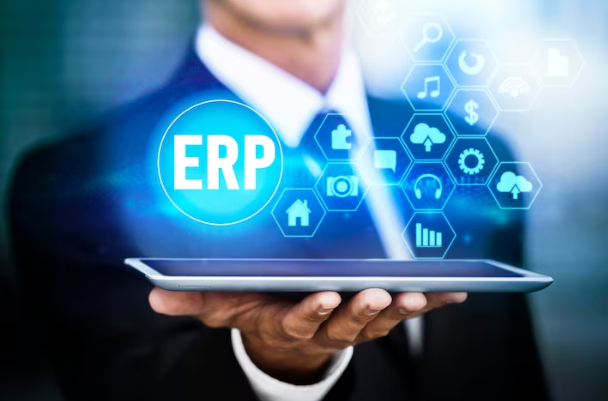Top ERP System – In today’s fast-paced business landscape, staying competitive requires more than just ambition; it demands strategic tools and solutions. This is where Enterprise Resource Planning (ERP) systems come into play. In this article, we’ll delve into the world of ERP systems, their significance, how to choose the right one for your business, and explore some real-world success stories that showcase their transformative power.
I. Introduction to ERP Systems
A. Brief Overview of ERP (Enterprise Resource Planning) Systems Enterprise Resource Planning, commonly known as ERP, is a comprehensive software solution designed to streamline and integrate various business processes and functions. It serves as a centralized hub for managing and optimizing everything from finances and human resources to supply chain management and customer relationship management.
The core idea behind ERP systems is to provide a single platform that enables real-time data sharing and collaboration across all departments, improving efficiency and decision-making.
B. Significance of ERP Systems in Modern Business In the digital age, businesses are overwhelmed with data and information from multiple sources. ERP systems play a pivotal role in managing this data by providing accurate insights into operations, enabling businesses to make informed decisions promptly.
ERP systems also enhance communication and collaboration within organizations, breaking down silos and ensuring that everyone has access to the same data. This not only streamlines operations but also fosters a culture of transparency and accountability.
II. Importance of Choosing the Right ERP System
A. Impact on Business Efficiency and Profitability Selecting the right ERP system can have a profound impact on business efficiency. An effective ERP system automates routine tasks, reduces manual errors, and improves overall productivity. This leads to cost savings and, ultimately, increased profitability.
Moreover, by providing real-time visibility into various aspects of the business, ERP systems empower decision-makers to respond quickly to market changes and customer demands, further enhancing competitiveness.
B. Long-Term Benefits of an Effective ERP System While the initial investment in an ERP system may seem significant, the long-term benefits far outweigh the costs. Over time, an ERP system can adapt and scale with your business, making it a sustainable solution that grows with you.
Furthermore, the data collected and analyzed by ERP systems can uncover valuable insights that drive strategic planning and innovation. This positions businesses to stay ahead of the curve and thrive in an ever-evolving market.
III. Criteria for Evaluating Top ERP Systems
To ensure you make an informed choice when selecting an ERP system, consider the following criteria:
A. Key Features and Functionalities Every business is unique, so it’s crucial to identify the specific features and functionalities your organization needs. Make a list of your requirements, such as financial management, inventory control, or customer relationship management, and assess how well each ERP system meets these needs.
B. Scalability and Customization Options As your business grows, so should your ERP system. Ensure that the system you choose is scalable and offers customization options to adapt to changing requirements.
C. Integration Capabilities Seamless integration with existing software and systems is vital to avoid data silos and maximize the value of your ERP investment. Check if the ERP system can integrate with other tools your business relies on.
D. User-Friendliness and Support A user-friendly interface is essential for employee adoption and efficient use of the ERP system. Additionally, consider the level of support and training offered by the ERP provider to ensure a smooth implementation process.
IV. Top ERP Systems in the Market
Now that you understand the criteria for evaluation, let’s highlight some of the leading ERP systems in the market:
A. SAP ERP SAP ERP is renowned for its robust capabilities in various industries. It offers comprehensive solutions for financial management, supply chain, and analytics, making it a preferred choice for large enterprises.
B. Oracle NetSuite Oracle NetSuite is a cloud-based ERP system known for its flexibility and scalability. It caters to businesses of all sizes and provides a wide range of modules, from financials to CRM.
C. Microsoft Dynamics 365 Microsoft Dynamics 365 combines ERP and CRM functionalities seamlessly. It’s known for its user-friendly interface and integration with other Microsoft tools, making it a preferred choice for businesses already using Microsoft products.
D. Infor CloudSuite Infor CloudSuite offers industry-specific ERP solutions, making it suitable for niche markets. It focuses on enhancing customer experience and streamlining operations.
V. Real-World Success Stories
A. Examples of Businesses Benefiting from Top ERP Systems
Company X: Streamlining Operations with SAP ERP
Company X, a global manufacturing giant, implemented SAP ERP to centralize its operations. This move allowed them to optimize their supply chain, reduce production costs, and enhance product quality. Within a year, Company X experienced a significant increase in profitability.
Startup Y: Scaling Rapidly with Oracle NetSuite
Startup Y, a tech company, chose Oracle NetSuite as its ERP solution. The cloud-based nature of NetSuite allowed them to scale rapidly without the need for extensive IT infrastructure. This flexibility helped them secure new clients and expand their market presence.
B. Challenges They Faced and How the ERP Systems Helped Overcome Them Both Company X and Startup Y faced challenges specific to their industries. Company X struggled with outdated legacy systems that hindered data sharing, while Startup Y needed a solution that could keep up with their rapid growth.
SAP ERP and Oracle NetSuite addressed these challenges by providing tailored solutions that improved efficiency and scalability. Company X’s supply chain became more agile, and Startup Y could focus on innovation rather than IT infrastructure.
In conclusion, selecting the right ERP system is a critical decision that can shape the future of your business. By considering key criteria and learning from real-world success stories, you can make an informed choice that leads to increased efficiency, profitability, and long-term success.
FAQs
What is an ERP system, and why is it important for businesses? An ERP system, or Enterprise Resource Planning system, is software that integrates various business processes and functions into a centralized platform. It’s crucial for businesses because it streamlines operations, enhances communication, and provides real-time data for informed decision-making.
How does choosing the right ERP system impact business profitability? The right ERP system can significantly impact profitability by automating tasks, reducing errors, and improving overall efficiency. It also provides valuable insights for strategic decision-making, further contributing to long-term profitability.
What criteria should I consider when evaluating ERP systems for my business? When evaluating ERP systems, consider key features, scalability, integration capabilities, and user-friendliness. These factors will help you choose a system that aligns with your business needs.
Can small businesses benefit from ERP systems? Yes, ERP systems can benefit small businesses by improving efficiency, scalability, and decision-making. Many ERP providers offer solutions tailored to the needs and budgets of small businesses.
How do ERP systems help businesses overcome specific challenges? ERP systems address challenges by providing customized solutions that streamline operations and enhance scalability. Real-world success stories demonstrate how different businesses have successfully overcome their unique challenges with ERP systems.

